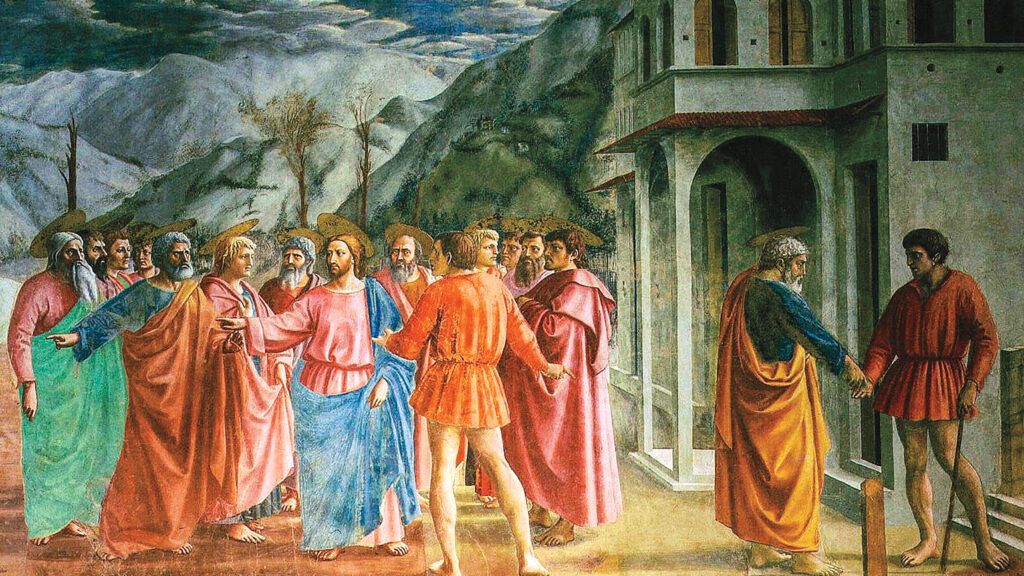Florence, Italy. I’d been there before on one of those scruffy five dollar-a-day youth-hostel jaunts through Europe, but now, just graduated from college, I was wondering what to do with my life. Could I live in Florence for a while, practice my Italian, write a little, grow up?
It seemed a crazy dream—not enough money or sense to manage it. Still, that fall, I bought a one-way plane ticket and checked into a cheap pensione near Florence’s railroad station. On a luminous October day, with the sharp aroma of espresso and cappuccino wafting from cafés, I crossed the Arno to the church of Santa Maria del Carmine. My goal: to gaze at a fresco I’d studied in art history.
It was The Tribute Money, painted by Renaissance master Masaccio in the 1420s. It exemplifies a turning point in Western art, when things became more realistic through the use of linear perspective.
The scene shows a miraculous event from the Gospel of Matthew. The disciples are in Capernaum, and Peter is challenged by a tax collector: Does Jesus pay the temple tax? Yes, Peter says, then goes back to Jesus, who knows all about the conversation without ever having overheard it. (There’s one miracle.)
In his usual fashion, Jesus turns the question back on Peter: “From whom do kings of the earth take their toll or tribute? From their children or from others?”
“From others,” Peter correctly replies. In other words, the rich and powerful look for every way to avoid paying their full weight of taxes.
“Then the children are free,” Jesus says, a line that makes me smile. The children, that’s us, Jesus’s followers. We’re free. Still, wishing not to offend the tax collector—after all, Matthew was a tax collector—Jesus tells Peter to go to the sea, cast his hook and take the first fish that comes up. Open its mouth. There will be a coin inside. “Take that and give it to them for you and me,” Jesus says.
In Masaccio’s fresco, you see everything happening at once. The tax collector accosts Peter, who goes back and talks to Jesus—the central focus of the painting—before extracting the coin from the fish’s mouth.
I started thinking about my own financial situation. I still had a bit of money left from painting my sister’s house and waiting tables over the summer. It was enough to stick around Florence for a month or two, guarding every cent. But I wanted to stay longer, make friends, study singing if I could, visit this fresco many times. I would have to find some source of income. But how? I didn’t know anybody. What could I do? It was nice enough for Peter to get something from the fish’s mouth in Capernaum. Miracles like that were the stuff of biblical times, not the 1970s, not for a wandering college grad husbanding a dwindling supply of travelers’ cheques.
I walked out and gazed up at the Duomo across the river. Churches abounded in this beautiful town. There was even an American church founded by expatriates. A professor of mine who had been here on sabbatical recommended it as a networking tool of sorts. “You might meet some nice people there,” he said. Maybe so, but I didn’t see how that was going to help my wallet.
Nevertheless, that first Sunday I went to the American church for worship and lingered at the coffee hour afterward—American coffee, alas, not espresso. The conversation was American too: frank, unapologetic, full of “Where are you from?” and “What are you doing here?” I introduced myself to a tall woman in her fifties and mentioned that I’d just graduated from college. “What was your major?” she asked.
“English,” I replied—a sure conversation stopper.
“Would you be interested in teaching English at my language school?” she said. Would I ever! Pennies from heaven—if not from a fish’s mouth.
That was my first job. Others miraculously followed: tutoring, babysitting, substitute teaching at the American school. I moved out of the pensione and rented a room on the outskirts of town. I joined the choir at the American Church and the choir at the Italian Duomo. I studied voice and began palazzo-sitting for an Italian contessa, walking her corpulent dachshund in the piazza twice a day. I was making a life and a living for myself in a foreign city where I’d arrived not knowing a soul.
Whenever I had a chance, between gigs, I would go back to the Masaccio and stare at it in that musty church. I was beginning to see its deeper meaning. God’s bounty could be found in the places you least expected. You simply had to trust and not be too greedy. You’d find the coin you needed. Enough to satisfy the moment. You did what you were called to do, like Peter the fisherman or Rick the English major, who’d discovered the joy of teaching.
By year’s end, I had enough money to fly home for the summer, but I was determined to come back. A friend suggested that I take over the one-bedroom apartment he’d be vacating. He took me to meet the landlord, an elderly Englishwoman who liked the rent delivered to her—with tea and biscuits and lots of chitchat. I left humming, “See you in September….”
How exactly was I going to make enough money to pay for the first month’s rent at the apartment remained a mystery. Nobody I knew back at home in Southern California needed a paint job, and I wouldn’t be there long enough to go back to waiting tables. The small amount of money I’d managed to save from my teaching and tutoring over the past few months was barely enough to pay for a week’s worth of food upon my return. Trust God’s provision, and be open to what anyone suggests, I reminded myself. Even if it seemed outlandish.
The suggestion from a friend that summer really did seem outrageous: “Rick,” she said, “you’re good at trivia. You should audition for this TV game show they’ve just revived, Tic Tac Dough.” This was 1978. I called up, was booked for an interview, drove the family station wagon to a studio. Long story short: As a contestant, I won a dining room set (which I managed to sell), a free trip to Europe for two (which I gave to Mom and Dad to come visit me) and $1,500. More than enough to cover initial costs back in Florence, where I happily lived another year.
Much has changed in the world since then. But I still hold on to the message I learned from that fresco. Trust in God’s providence. Don’t be greedy. There will be enough for the day. Take it from the fish’s mouth.






